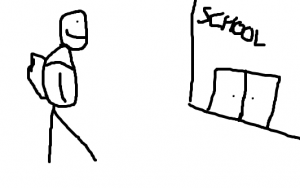Odd Grammatical Terms – The Test! Posted by Sten on Apr 26, 2016 in Dutch Grammar, Dutch Vocabulary
Two weeks ago, we discussed grammatical terms that are related to nouns, such as the onderwerp, lijdend voorwerp, meewerkend voorwerp, and others. Last week, we discussed terms that are related to verbs, such as the werkwoord, gezegde, naamwoordelijk deel van het gezegde, and others.
This week, you will have the chance to see whether you got it right! The results of the test will be published next week on our Facebook  page. If you have questions about an exercise, you can contact us! Obviously, we will not just give you the answer 😉
page. If you have questions about an exercise, you can contact us! Obviously, we will not just give you the answer 😉
So, how does it work? You will be given a Dutch sentence, and it is your job to ontleed (dissect) the sentence. So call every element by its right term!
Example: Op de markt geeft Max een bedorven appel aan Tim.
persoonsvorm – geeft
onderwerp – Max
lijdend voorwerp – een bedorven appel
bijvoeglijk naamwoord – bedorven
meewerkend voorwerp – Tim
bepaling – op de markt
gezegde – Max geeft aan
(On the market, Max gives Tim a rotten apple)
As you can see, some are overlapping. First, you have to find the persoonsvorm (see the post how to do it!). Then, you can find out the onderwerp. This can already form the gezegde, but first look at the other nouns: lijdend voorwerp, meewerkend voorwerp, and other bepalingen. You can specify what kind of bepaling it is (tijd, plaats, etc.), but you don’t have to.
If a word has an bijvoeglijk naamwoord or a bijwoord, you can put it underneath the word that it is related to after an indent (as done in the example with bedorven).
Even though the first two posts had example sentences in English, these will be in Dutch. Try to translate them, and put the translation underneath your ontleding (dissection). The translations of all sentences will be at the end of this post, because the main point is the ontleding, not vertaling (translation).
The solutions will be posted on our Facebook page on Friday, the 29th of April! Veel succes!
1. Max loopt naar school.
2. Lucas speelt graag piano.

Lucas speelt graag piano.
3. Lucas bidt vaak in de kerk.

Lucas bidt vaak in de kerk.
4. De zon gaat ‘s avonds onder aan de horizon.

De zon gaat ‘s avonds onder aan de horizon.
5. Tieneke en Jantien drinken gezellig een kopje koffie achter in de middag.

Tieneke en Jantien drinken gezellig een kopje koffie achter in de middag.
6. Tijdens het avondeten staat vader op om naar de wc te gaan.

Tijdens het avondeten staat vader op om naar de wc te gaan.
7. Er staan veel mensen op de kade en op boten te wachten op de koning.

Er staan veel mensen op de drukke kade en op veel boten te wachten op de koning. (Image by BakerlooTheReal at Flickr.com under license CC BY 2.0).
ENGLISH TRANSLATIONS OF THE SENTENCES
- Max walks to school.
- Lucas likes to play the piano.
- Lucas often prays in the church.
- The sun sets in the evening at the horizon.
- Tieneke and Jantien gezellig-ly (for lack of a better translation!) drink a cup of coffee late in the afternoon.
- During dinner, father gets up to go to the toilet.
- Many people stand on the busy quay and on many boats waiting for the king.
The solutions will be posted on our Facebook page on Friday, the 29th of April!

Build vocabulary, practice pronunciation, and more with Transparent Language Online. Available anytime, anywhere, on any device.
About the Author: Sten
Hi! I am Sten, both Dutch and German. For many years, I've written for the German and the Dutch blogs with a passion for everything related to language and culture. It's fascinating to reflect on my own culture, and in the process allow our readers to learn more about it! Besides blogging, I am a German-Dutch-English translator, animator and filmmaker.




